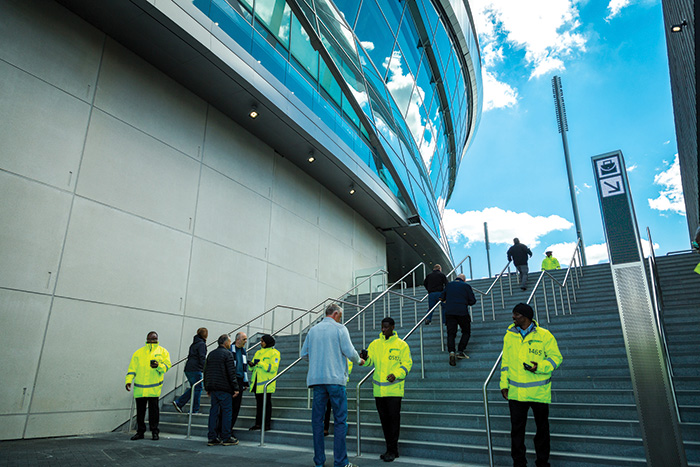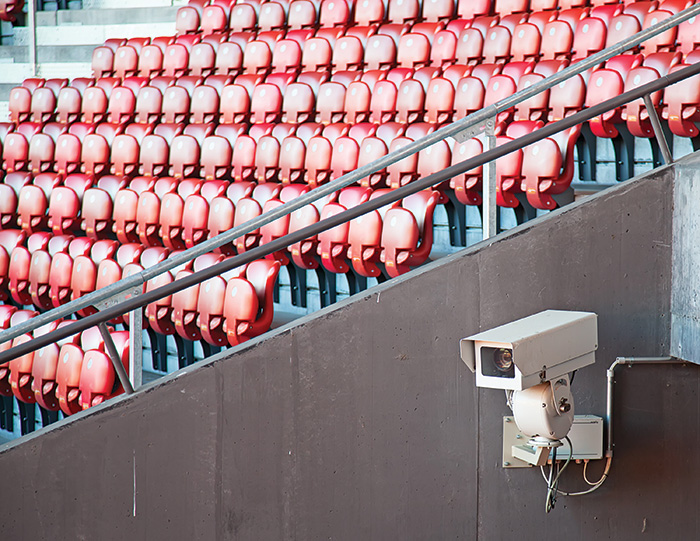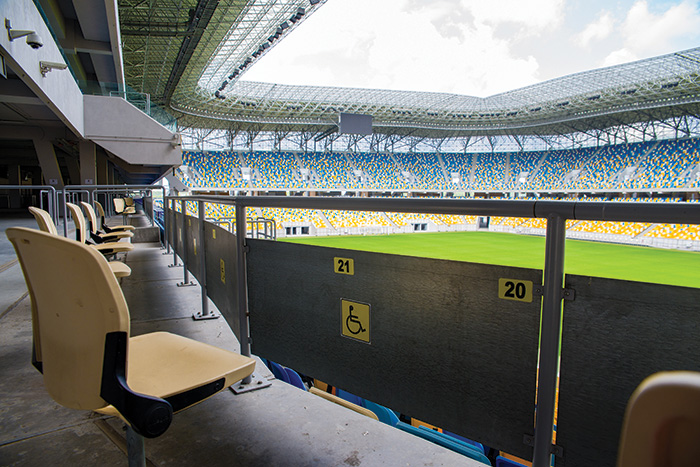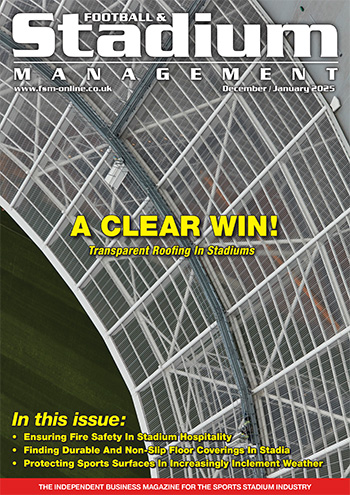Safeguarding Supporters:
Looking After Children And Vulnerable Adults In Football Stadia

Safeguarding children and vulnerable adults at all levels of football stadia, from the Premier League to the National League, is a fundamental duty of the security staff and stewards employed on match days. It is their responsibility to ensure the game is a safe, positive and enjoyable experience for all match‑goers, whether they be spectators, athletes, competitors, performers, or even members of the venue staff.
Children and vulnerable adults in particular may be at a higher degree of risk due to large crowds, unruly behaviour and other safety concerns that may compromise their safety on match days.
However, the extent to which this duty of care to children and vulnerable adults reaches has recently been contested within the industry, and the policies and measures in place to ensure their safety vary between stadia. So, how can we ensure that stewards and security officers are safeguarding children and vulnerable adults to the best of their abilities, and where does this duty of care start and end?
Heightened Risks For Children And Vulnerable Adults

As part of their overall responsibility for safety, it is up to the security staff and ground management to safeguard the welfare needs of children, young persons and vulnerable adults. Football matches are indeed exciting events – from the passionate cheers to the hordes of match‑goers - particularly for young and inexperienced fans. However, they also present certain unique risks to both young people and adults that require extra care or special assistance. For instance, these individuals may have difficulty taking care of their own needs and require supervision from a parent or carer, particularly when it comes to safely navigating the stadium.
For vulnerable adults, such as elderly spectators, appropriate supervision or assistance based on their individual needs may be necessary, including accessing stadium facilities and assistance with seating accommodations. Where a child or vulnerable adult is separated from their parent or carer, it is also ground management’s duty of care to step in and ensure their welfare and safe return. Enforcing a zero‑tolerance policy for any behaviour that could endanger the safety or wellbeing of younger and vulnerable fans, such as harassment, discrimination, and violence, should also be ensured.
Effective Safeguarding In Stadia Of All Sizes

The size of a stadium and its capability to host events will be a substantial factor in how safeguarding procedures are undertaken. A smaller stadium may not have the resources to implement a more robust, large‑scale safeguarding policy. However, larger stadiums may have greater capacity to achieve this, with the ability to deploy teams solely geared towards safeguarding measures.
Overall, safeguarding children and minors is often implemented differently, varying from stadium to stadium; for instance, some clubs will allow minors and those under 16 to enter without an adult, and others will take a stricter approach and not allow minors in unaccompanied. Physical guarding, or ‘manguarding’, is an essential element of the safeguarding process, referring to staff’s physical presence when providing security and reassurance to match attendees. Manguarding allows security personnel to use their training to provide appropriate care and attention, whilst communicating effectively with the individual in question, chaperoning them if necessary or stepping in to diffuse conflict.
For instance, Welfare and Vulnerability Engagement (WAVE) training will be a new requirement for all licenced venues1, developed to provide those working in the licensed industry with an awareness of vulnerability, their responsibilities it and how to deal with it. Larger clubs are beginning to introduce this training package into their safeguarding measures, ensuring frontline security is efficient in identifying vulnerability and making appropriate interventions. Staff may also receive scenario‑based training, emulating situations such as a lost child or a vulnerable adult in distress, to allow them to practice their response skills in a controlled environment.
Manguarding works hand‑in‑hand with stadium CCTV systems – which can monitor a single individual in a five‑figure crowd - whilst still monitoring all others at the match, allowing for the effective identification of children or vulnerable adults in distress. For large stadiums, there may be a designated matchday control room in which all key stakeholders are present, such as the ambulance services, CTU, Police, IT, Security and Maintenance. Each matchday, these essential teams will have representation present to make decisions and take appropriate action where needed.
The matchday control rooms will be the central communications hub with state‑of‑the‑art visuals, reporting via radio and CCTV. High‑quality visuals allow for ease of identification of children, who may have otherwise been missed. Likewise at a smaller stadium, the same will be true on a smaller scale; key security and stewards will have two‑way radio devices and a chain of command will ensure appropriate action. While such sophisticated technology may not be utilised at National League matches, smaller crowds allow for disturbances and vulnerable people at risk to be spotted by the naked eye.
Where Does This Duty Of Care Extend?
The extent to which staff must uphold a duty of care to children and vulnerable adults throughout the match day, and at what point this begins and ends, has been hotly contested within the industry. Whilst any safeguarding policy will be dictated by relevant legislation – including the Children Act 1989, the Children Act 2004 (England and Wales), the Safeguarding Vulnerable Groups Act 2006 and the Children and Young People (Scotland) Act 2014 - different stadium managers take different stances on their level of responsibility.
Most larger football clubs will have a designated safeguarding team, to which any safety issues are directed towards for them to mitigate, which may be escalated to trained emergency personnel if necessary. Many stadia may view the stewards’ role, for instance, as simply to manage crowd control, and therefore would not expect these employees to enforce more complex safeguarding measures to those at a higher risk. Other members of security staff may view themselves as responsible for only those within the ground, with their duty of care to children and vulnerable adults ceasing to exist once these individuals have left the stadium. Contrastingly, other members of staff may view a ticket holder as their responsibility whether inside or outside the stadium, and for the duration of the match.
All‑Round Protection For Those At Risk

With football crowds in excess of 50k in some instances, managing safeguarding operations is a huge task. It takes numerous people and often many agencies working together in sync to ensure the safety and enjoyment for every match‑goer.
While staff have a duty of care to all attendees, often, keeping children and vulnerable adults safe requires an extra level of care, particularly during cases of separation from a parent or carer, or when faced with violent or unruly fan behaviour.
However, there is industry debate as to how far staff duty of care to these individuals extends, whether from entrance to exit, inside or outside the stadium, or before or after the match itself. Perhaps what is needed is clearer policies concerning the extent to which staff must uphold a duty of care to children and vulnerable adults, and more consistency when it comes to which members of staff should be enforcing them. Arguably, all members of staff should be sufficiently trained in safeguarding measures, and this responsibility should not be delegated to others, ensuring that these individuals are protected – at all times.
Click the article to enlarge it.













































